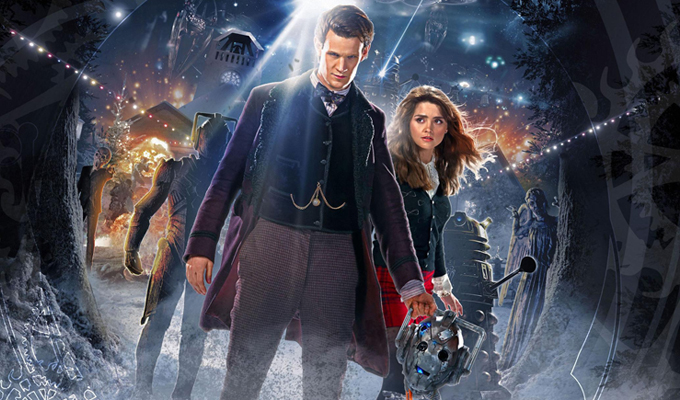Matt Smith’s Final Doctor Who Delivers a Lump of Coal

Recently I returned to watching Doctor Who, after years (decades more likely) away. I did so because of the incredible excitement and passion of the current fandom — after all, millions of screaming fans can’t be wrong, right? So I watched most of the previous season, and caught up on some of the run of the ninth and 10th Doctors.
That led me to be full of anticipation for the most recent episode, in which the 11th Doctor, Matt Smith, bids his farewell and regenerates into the 12th Doctor, to be played by Scotsman Peter Capaldi. The episode was aired on Christmas Day and was a Christmas-themed special, so imagine my surprise when instead of a wonderful gift of an episode I found a lump of coal in my stocking. To explain why I need to reveal some spoilers, so if you recorded the episode “Time of the Doctor” and haven’t watched it yet — SPOILER ALERT!
[divider]
Steven Moffat, the show runner for Doctor Who and the writer of “Time of the Doctor” is the Grinch in this scenario, but it wasn’t his heart that was two sizes too small. it seems to have been the part of his brain involved in writing intelligent creative fiction. And the worst part was, he did so by violating the very situations he himself had set up, both within this episode and in previous stories. The story ultimately takes place on Trenzalore, the planet that we have known for a long time as the ultimate grave site of the Doctor. And yet, despite the ominous future of this completely alien world, Moffat puts a town of perfectly human-like people on it — a town called Christmas. That name seems to have no bearing whatsoever on the story, except that it is a Christmas special, so some nod seems to have been required.
Moffat also completely screws up what may be one of his most disturbing enemy creations, the Weeping Angels. As soon as the Doctor and his companion Clara Oswald arrive on Trenzalore, they find themselves surrounded by snow-covered Weeping Angels. Now, the trick is, if you look at a Weeping Angel you have to keep looking, because they can’t move (being statues of angels and all). But once you look away, they zoom in for a certain and violent death. The Doctor instructs Clara not to look away, but they both keep turning their heads, looking from one to another. As original defined, the Weeping Angels would have rushed in and ripped them to shreds. No explanation is given as to how they managed to escape simply by running away.
Even one of the very conditions he wrote into the episode itself is violated by Moffat. Christmas is surrounded by some form of Truth Field, which forces one to say the exact truth when confronted with a direct question. The Gallifreyan Time Lords, trapped in a pocket dimension for their own safety by all the Doctors in the recent 50th anniversary episode, have torn a small rip in the universe somewhere in Christmas and through it are repeatedly broadcasting to the entire universe the question, “Doctor who?”, trying to get the 11th Doctor to say his secret name which is apparently the key to getting them back in this universe. Yet the 11th Doctor resists saying it out loud, despite the fact that mere minutes prior his was spilling all sorts of uncomfortable truths without control.
The show even teases the idea that maybe the 11th Doctor is actual the source of the Father Christmas legends, by having him spend 300 years in the town to keep all of the evil alien forces in their vast spaceship armadas in orbit from destroying the town. He slowly ages, starts wearing fur-lined jackets (already a purple that could shade easily into burgundy) and becomes the local repairman for the children’s toys. Does Moffat do anything with this and the fact that they are in a town called Christmas? No. That is all just lip service to appeal to people who tuned in on Christmas Day, and nothing more.
To be fair, Moffat completely jumped the shark, story-wise, in the 50th Anniversary episode, by negating the very thing that made the Doctor, when the show returned to the BBC with the ninth Doctor, a tragic and flawed hero. As originally defined, the ninth Doctor (yes, I know, technically the War Doctor, but still that makes him the ninth, and Christopher Eccleston’s version the 10th) wiped out his entire planet and all the Time Lords to save the universe from the Daleks, also wiped out. Moffat decided to change all of that in the 50th Anniversary episode, and so the 10th and 11th Doctors got together, ultimately with all 13 to save Gallifrey by hiding it in a pocket dimension. This was supposed to be a trick to convince any remaining Daleks not also destroyed in the attack that they had vaporized Gallifrey. And yet in “Time for the Doctor,” the very next episode Moffat wrote, he negates that by having the Time Lords shout at the entire frigging universe from a tear in reality. So much for hiding.
When Doctor Who gets some guest writers, like the brilliant Neil Gaiman, who has written a handful of episodes during Moffat’s run, it is still very enjoyable. But Moffat has turned it into a confusing pale shadow of the show that had millions of people weeping for Rose Tyler and David Tennant’s 10th Doctor. The episode “Time for the Doctor” was just the latest, and most egregious example of Moffat’s awful story telling.



